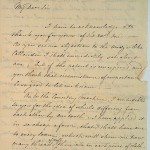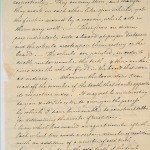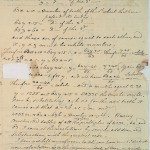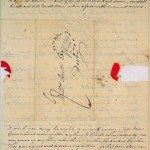Letter from Charles Bage to William Strutt, 1818/02/25
My Dear Sir
I have to acknowledge and to thank you for yours of the 20th InsÄ
As you see no objection to the wedge like Callender I shall immediately set about one; but if the patent is unexpired and you think that circumstance of importance be so good to let me know. _
As to the Counting Machine, I am indebted to you for the idea of wheels differing from each other by one tooth. I have applied it in so cheap a form, that I shall have one to every loom, which will shew me how many threads of waft there are in each piece of cloth. The plan is this. I have three wheels of iron each about 4 In diameter, having 63.64 and 65 teeth respectively. _ They are very thin, and though they work in each other like spin wheels, yet the first is moved by a worm which acts in them very well. _ Three pins are driven perpendicularly into a board at proper distances and the wheels work upon them resting on the board. _ The wheels are painted, in order to enable me to number the teeth; and there are three pins near the wheels, fixed in the board that serve as indices. Whenever the loom stops I can read off the number of the tooth that stands opposite its respective index. It may not be uninteresting to you and Mr Silvester to give you the process by which I have been enabled to construct tables for determining the number of Revolutions.
Every wheel has moved an equal number of teeth. Each wheel has made a certain number of revolutions with an addition of a number of odd teeth. Suppose for instance the odd teeth of the first wheel are 10, of the 2nd 15 and of the third 60
Then let x = number of revolutions of the 1st
y = – of the 2nd
z = – of the 3rd _
63x + 10 = Number of teeth of the 1st wheel that have passed its index.
64y + 15 = Ditto of the 2nd
65z + 60 = Ditto of the 3rd
And these are of course equal to each other, and x, y, and z must be whole numbers.
Therefore 63x + 10 = 64y + 15 .«. x = (64y + 5) / 63 .«. Therefore (y + 5) / 63 = a whole number put (y + 5) / 63 = a .«. y = 63a _ 5
Again 65z + 60 = 64y + 15 .«. z = (64y _ 45) / 65 .«. (y + 45) / 65 =
Substitute 63a _ 5 for y, and we have (63a + 40) / 65 = whole
Therefore (2a _ 40) / 65 = whole _ and a must be equal to 20
y = 1255 and 64y + 15 = 80335 the number sought. Now by substituting a, b and c for the odd teeth it comes out that a _ 2b + c = m and 4032m + 64a _ 63b = number sought. Having constructed tables of all the necessary multiples of 4032, 64 and 63 I come at the revolutions by simple addition and subtraction with the greatest east.
I have not left myself room to tell you how much I distrust your calculation as to the improving state of man in society. In proportion as knowledge is diffused amongst the lower orders, the fears and vigilances of Government will increase. More violent and sanguinary laws will the thought necessary to keep us down _ and if we will not be kept down, we shall burst out into revolution when a favourable moment occurs. I wish you may be right and myself wrong. You know Government never yields anything to threats or importunity; nor ever give up anything when there is neither the one nor the other. They give a great deal to secure majorities, so that force alone can wring anything from them. Mrs Bage desires to write her best regards with mine to you and yours _ yours sincerely Chas Bage
William Strutt Esq
Derby.









